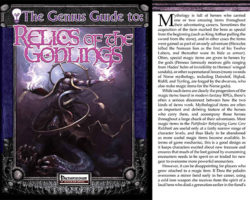The Genius Guide to Relics of the Godlings by Owen K.C. Stephens is a role playing game supplement published by Rogue Genius Games (originally Super Genius Games) for use with the Pathfinder Roleplaying Game. As such, it is covered by the Open Game License and some parts are considered to be Open Game Content as a result.
The supplement is available as a 19-page PDF from DriveThruRPG for $3.95 but was purchased at a reduced price as part of a special bundle. Around two thirds of a page is the cover illustration and one page is the Open Game License and credits.
 The introduction explains that mythology is full of heroes that carried one or two items throughout their careers, but the descendants of these, the magic items found in RPGs, are often lacking, especially as most items are only useful for a limited range of levels before being outclassed. An item that a player might become attached to can quickly become comparatively useless, and this supplement aims to fix that.
The introduction explains that mythology is full of heroes that carried one or two items throughout their careers, but the descendants of these, the magic items found in RPGs, are often lacking, especially as most items are only useful for a limited range of levels before being outclassed. An item that a player might become attached to can quickly become comparatively useless, and this supplement aims to fix that.
How to Use Relics in Your Campaign explains that there are two main ways; as plot points that adventures are built around or as near-permanent additions to characters, like the legendary gifts of the gods. They can be relics given to godlings, from The Genius Guide to the Godling, The Genius Guide to Mystic Godlings and The Genius Guide to the Godling Ascendant or as relics of such. If the items remain around, the GM could hand out just a few at certain points in the campaign.
The Cost of Relics: Paying the Piper has ways in which characters might develop their relics, with them as feats, templates, assumed treasure, money sinks and power boosts, depending on how the GM decides they improve.
Relic Rules explains that most of the time relics work like normal magic items, but there are a couple of occasions where they are more like artefacts; only magic capable of finding an artefact can find them and they cannot be destroyed by normal forces either. Nor can they be created by mortals.
Relics has eight different relics, which appear to be based on various items from mythology. Each has a brief description, then a list of their powers. The power of a relic changes every level, with new abilities being gained or existing ones enhanced.
Creating Relics for Your Campaign starts with an overview of how to do this, then has two templates, one for a staff, one for a weapon, which break down what sort of abilities a relic would gain at each level.
The Genius Guide to Relics of the Godlings in Review
The PDF lacks bookmarks and has enough different sections that these would have been useful. Navigation is poor. The text, which appeared to be free of errors, follows Super Genius’ old three column landscape layout that is designed to be easier to read on electronic devices. It is less convenient on small screens though and not really ideal for printing. There are a number of black and white illustrations for the relics, which may be custom but which also appeared to have been desaturated from colour. Presentation is okay.
The idea of a magic item that scales as a character gains power is a nice one; it means that an item will more than likely remain in a character’s possession, if that option is taken; they may not be at the artefact level but the range of powers is useful. The two templates for creating relics are also useful, though it’s a shame there aren’t more for more items. The relics given aren’t bad, but they do seem, which is a bit odd, given their mythical origin, a bit bland in the descriptions. This does make them easier to drop into other campaigns, but a GM might be advised to rework the descriptions to tie them into a campaign more. The Genius Guide to Relics of the Godlings is an interesting collection of items and ideas for scaling magic items and can be found by clicking here.

Leave a Reply